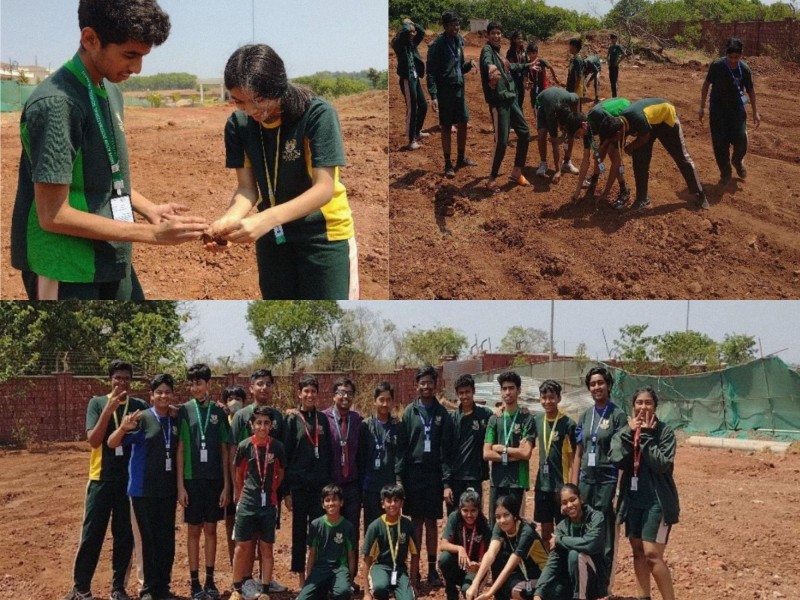-Subhranil Ghoshal, facilitator, Indus Altum International School, Belagavi
Did you know 96 percent of songbirds depend on caterpillars as a food source to survive?
And between 6,000 and 9,000 caterpillars are required by a pair of Carolina chickadees to raise just one brood of young effectively.
It’s important to plant native trees and plants to support other birds and wildlife. A native oak tree can support caterpillars of over 500 species of butterflies and moths. The places where birds live have been taken away by us to develop the towns and cities.
Chimpanzees have already disappeared from four countries namely Gambia, Burkina Faso, Togo, and Benin due to deforestation and poaching. Over 1 million chimpanzees existed on the Earth before the early 1990s, today, just 172,000-300,000 chimpanzees are left according to the estimation, and now these are classified as endangered species.
Climate change is not only increasing our earth’s temperature, but it also makes soil erosion worse, and some countries have started paying the price.
But, why are we so silent? Why are we waiting for others to start to make a change? Do we know that a small act of ours can bring revolution to our planet?
Indus Altum International School, Belagavi, Karnataka has taken this initiative as a challenge to develop a self-sustaining backyard called the ‘Backyard Planet’ as a part of the Innovation curriculum for secondary students.
Now, the question is what is this Backyard Planet?
A small patch of land is to be converted into a natural habitat by taking care of all the little details that make a habitat whole. It refers to a hypothetical scenario where our students are creating a self-sufficient ecosystem in our school’s backyard, providing for all their needs without relying on external resources. This idea envisions creating a microcosm of a larger, self-sustaining planet where waste is recycled in every manner, energy is generated from renewable sources, and food and other necessities are produced in a closed-loop system.
Our school has taken this initiative under the ‘Green Eagles project’ where the motto is ‘Environmental consciousness that includes people with the same set of values; people who care about natural habitats and use renewable resources and who can act for the sake of nature and put others ahead of themselves’.
The idea of making a self-sustainable backyard planet is important for several reasons:
– Making a self-sufficient ecosystem helps us reduce our dependence on non-renewable resources and minimise our direct environmental impact.
– It helps us to produce food locally instead of using harmful chemicals, which helps to build a secure environment and reduce our dependence on industrial agriculture.
– The process of creating a self-sustainable ecosystem (backyard planet) can serve as an educational tool, teaching people about sustainable living practices and the interconnections between different components of an ecosystem.
Overall, the idea of a self-sustainable backyard planet highlights the creation of eco-conscious individuals and increases their potential positive impact on the environment while also improving their own lives.
Building a self-sustainable backyard planet in our school involves the following steps:
Step 1: We have determined the goals and objectives starting from desired outcomes and resources available for this project.
Step 2: Our students started researching sustainable practices, such as permaculture,
aquaponics, and renewable energy systems.
Step 3: Each Grade of our school plan and design the layout of the backyard planet, taking into consideration factors such as sunlight, water, and soil conditions of that selected area.
Step 4: Then, they build the infrastructure needed for this project, such as water collection and storage systems, and renewable energy sources. As of now, they came up with intensive research on a diverse array of plants, herbs, and shrub species that can thrive in the environment without human interventions.
Step 5: The students will incorporate animal systems, such as bees, frogs, and fish, to enhance the ecosystem’s productivity to make it more self-sustaining.
Now, the question is what we will be getting from this project. Building a self-sustainable backyard in our school environment can enhance students’ learning in several ways:
Hands-on learning: By actively participating in the process of design, construction, and maintenance of the Backyard planet, students will gain hands-on experience with sustainable practices and systems which will help them to build a concrete understanding of the concept.
Interdisciplinary learning: Building a backyard planet incorporates multiple subjects, including science, technology, engineering, math, and environmental studies, approaches of humanities which offer students the opportunity to integrate and apply their knowledge and skills in a real-world context through this project.
Problem-solving and critical thinking: Students are challenged to identify and solve problems related to this project, make decisions individually and in groups, and use critical thinking skills through the process of designing and maintaining a self-sustainable ecosystem which in turn helps them to develop real-life context.
Environmental awareness and responsibility: Sustainable practices encourage students to become more aware of the impact of their actions on the environment and develop a sense of responsibility for the planet by building leadership qualities.
Community building: A sense of community can be built among students, teachers, and the wider community by building a backyard planet that also promotes teamwork and collaboration, and cooperation.
Career exploration: Students may develop an interest in related fields, such as agriculture, renewable energy, and environmental science, potentially influencing their career choices in the future by gaining hands-on experience in sustainable practices.
Overall, building a self-sustainable backyard planet in our school environment helps students to be engaged and also fosters an educational learning experience for students, offering opportunities to develop a wide range of skills and knowledge, and promoting environmental responsibility, eco-consciousness, and stewardship.
Also read:
